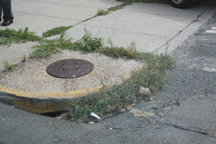The day after reading a letter complaining about catch basins being clogged with weeds and litter along Avenue E, Steve Gallo, who serves as city business administrator and executive director of the Municipal Utilities Authority, was out on the road to check it out – but could not find the problem.
The letter complained about high weeds near corners and catch basins overflowing with debris.
To prove his point, Gallo took a reporter from the Community News around the city, checking catch basins from the most southerly portion of Avenue E at Broadway to the northern part of the city at the entrance to the New Jersey Turnpike at 56th Street.
While a tour of the city found several catch basins where weeds were growing, nearly all were free of debris.
In areas where there are overgrown weeds, property owners are responsible. This is part of the reason why the city instituted a new property maintenance code to require owners – especially absentee property owners – to clean up sidewalks and others area where weeds are overgrown.
“If we were to get a grade for keeping our catch basins clean, we would get a B.” – Steve Gallo
________
Gallo said the city has to handle multiple tasks when dealing with run off basins. Because of changes in environmental laws, the city is required to install tighter mesh to catch debris before it goes into the drain and eventually into local waterways.
“We ride around on a regular basis. We have zone managers driving around looking for issues like that so we can respond, especially after rain storms when there is a lot of drift towards the catch basins. But we could not identify the conditions described in that letter that would want to force a person to leave town.
“Obviously when we read a letter like that we’re disappointed,” Gallo said. “We’re just trying to do a good job. Our primary mission at the MUA is the maintenance of the water and sewer mains in the street. The collecting of litter is a combined effort of Public Works and the MUA.”
Weeds around storm water drains are a problem because the city cannot use weed killing chemicals since it would flow into the local waterways, which is in violation of environmental regulations.
“So we have to really hack away at them,” Gallo said.
Keeping these storm water drains free of litter requires a combination of city and public awareness, Gallo said.
The city sweeps and performs other services, but litter is a problem. Voters have consistently resisted side street sweeping, which means that homeowners have to be more responsible for keeping these streets clean and the city needs to develop creative ways to get the litter up from between parked cars.
“If the public wanted us to sweep these, we would reevaluate the situation,” Gallo said. “But we haven’t heard that human cry for that to happen. It would be an expense, but we would find a way to do it. I think the commercial districts are in pretty good shape.”
Urban Enterprise funds help a lot in these areas, as does the hiring of seasonal help during the summer.
In an effort to save money and to better harness resources, the city has been considering revamping the Town Center Management Corporation to do away with the duplication of services it shares with the UEZ. That way, the UEZ could focus more on the everyday cleanup of the city while the Town Center would focus on its primary mission of helping local businesses.
While the city in the past has installed more receptacles that would allow residents to help keep the city clean by putting trash in these rather than on the street, vandals and others have damaged and even stolen these receptacles.
The city is about to install new ones as the result of a contract with a private vendor, who will install and maintain the new trash cans and will even pay the city, since the new receptacles will featured lighted advertisements on their sides, powered by solar panels. These will also even provide internet connection for anyone using a laptop near by.
“They will be paid for by a private company that will sell advertizing space on the sides,” Gallo said. “We’ll get a portion of the advertizing revenue. They maintain them if they break. We’ll get about a quarter million dollars a year from them.”
Al Sullivan may be reached at asullivan@hudsonreporter.com.
